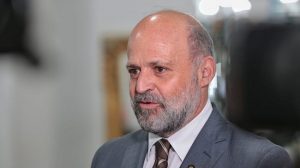The Global Environment Facility’s member countries will meet in mid-June 2024 to consider allocating more than $700 million in grants for diverse environmental initiatives in developing countries, including the first-ever projects financed by the Global Biodiversity Framework Fund and large programmes focused on land health, chemicals, and cities.

In back-to-back Council meetings of the GEF Trust Fund, Global Biodiversity Framework Fund, Least Developed Countries Fund, and Special Climate Change Fund, representatives of the 186 governments are set to build on efforts to ensure donor funding moves quickly and efficiently to reach areas of greatest need for the planet.
“The GEF family of funds is uniquely placed to deliver this diverse set of support where it is most needed – from small islands to the high seas, from cities to the desert,” said Carlos Manuel Rodríguez, CEO and Chairperson of the GEF. “We are committed to working in an integrated, inclusive way to deliver lasting impact across all six multilateral environmental conventions we serve, and in all developing countries where the GEF is supporting action with strategic funding.”
The nearly $500 million GEF Trust Fund work programme is set to unlock another $5.8 billion in co-financing from other sources. The GEF Trust Fund package covers 65 countries, including 18 Least Developed Countries and 16 Small Island Developing States, with a total of 25 projects and programmes that span all five focal areas of the GEF’s operations.
If approved, the GEF Trust Fund work programme would support 28 million hectares of land and marine areas for biodiversity benefits, contributing towards Global Biodiversity Framework targets including the goal to protect 30 percent of land territory by 2030. This includes 2.6 million hectares of protected areas and 7 million hectares of landscapes in countries of the Sahel through the regional program Transformation Approach to Large Scale Investment in Support of the Implementation of the Great Green Wall Initiative, plus the Improved Management and Conservation of Wetlands in Yemen’s Socotra Archipelago and Aden Wetlands.
Chemicals of concern and waste are major components of the GEF Trust Fund work program, reflecting the priority to help countries meet their international commitments through the Stockholm Convention on Persistent Organic Pollutants and the Minamata Convention on Mercury. This includes support for a major industrial project in Bolivia that will reduce persistent organic pollutants in the air by targeting processes in cement, textile, brick, and glass production. The Global Electronics Management programme aims to reduce the generation of e-waste, and the Control and Reduction of Mercury Emissions from the Cement Industry in Brazil project will focus on both regulations and capacity-building to ensure improved monitoring and management of the cement industry.
Other proposed initiatives include efforts to support nature-based solutions in Bosnia and Herzegovina and to improve the restoration and forest management of the Algerian Pine Forest. The work programme also includes a major effort in transboundary water management, with plans to place under improved cooperative management an additional four shared water ecosystems, including in Central America and around the Caspian Sea, plus an initiative to conserve terrestrial and marine biodiversity in vulnerable sites in Somalia.
Council members will also consider the approval of the Sustainable Cities Integrated Programme, the last of the 10 Integrated Programmes included in the GEF-8 funding cycle running from July 2022 to June 2026. In blended finance, there is a proposal to support a “Coral Bond,” an outcome-based bond to be issued by the World Bank that replicates and improves the previously funded Wildlife Conservation Bond (“rhino bond”) issued in 2022. The new bond is significant because it will target improved management of an entire ecosystem in Indonesia rather than a single species, offering an opportunity to significantly increase the biodiversity impact in an area of unique marine richness.
Altogether, nearly 35 million people, of which half are women, are expected to directly benefit from GEF Trust Fund’s proposed projects and programmes.
The first work programme of the GBFF comes less than a year after the new fund was launched at the Seventh GEF Assembly in Vancouver, Canada, with financial commitments to date from Canada, Germany, Japan, Luxembourg, Spain, and the United Kingdom. Its first three projects include one initiative in Mexico and two in Brazil, each working to support protected areas (on land and at sea) with long-term financing and with an emphasis on Indigenous-led conservation. In total, these initiatives would support 30.5 million hectares of terrestrial and marine protected areas, and directly benefit 229,000 people.
Council members will also meet as the LDCF and SCCF governing body, considering $203 million in funding for 14 climate adaptation initiatives. The proposed work programme for the LDCF – the only dedicated source of multilateral climate adaptation funding for Least Developed Countries – includes national projects in Angola, Cambodia, Chad, Comoros, Gambia, Guinea, Lao PDR, Sao Tome and Principe, Sierra Leone, Somalia, and Tanzania. It is the largest LDCF work programme in its history. The LDCF/SCCF Council will also consider support for the Great Green Wall Initiative alongside the GEF Trust Fund, and for a global programme focused on adaptation innovation. There is no SCCF work programme for consideration at the June Council.
Across the GEF family of funds, all proposed projects and programmes comply with the institution’s policies and requirements to integrate gender perspectives in their design and implementation. Projects to be reviewed by the Council include related measures such as stakeholder engagement plans to ensure meaningful participation of women in consultations and decision-making; the establishment of community-based organisations that include women and people with disabilities in natural resource management and decision-making; the adoption of just transition principles in projects’ planning and operations, such as providing opportunities for women in male-dominated fields; and other steps reflecting the GEF’s commitment to working in an integrated and inclusive manner for positive impact.
